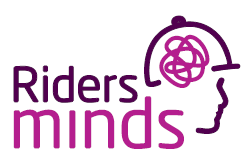
MENTAL HEALTH STUDY REVEALS 6 IN 10 RIDERS SUFFER FROM DEPRESSION AFTER A CONCUSSION

Research in 2021 by Charles Owen and University of Sussex MSc student Charlotte Ricca showed staggering statistics:
The study asked participants to share details of any falls in the past 12 months. It then went on to evaluate their mental health before the fall, after the fall and in the most recent two-week period during the study.
Mental health was measured using an industry standard test (PHQ-9, Kroenke et al, 2001).
58% of concussed participants reported a significant increase in depression and anxiety scores after their fall.
The data showed that the more severe the head injury, the more severe the symptoms of depression and anxiety. Results also found that 30% of riders who suffered from depression had prolonged mental health problems, some up to one year after their accident.
RESEARCH REPLICATES STUDIES IN CONTACT SPORTS
Head of Innovation at Charles Owen, Matt Stewart, explains,
“Our study has replicated what has been found across other studies in sport, particularly those in rugby and American football where 28% of professional NFL players have serious cognitive impairment as a result of concussion. An accident in horse riding has the potential to involve higher forces than other sports so it’s a fascinating area to study.”
Explaining why there may be a correlation between concussion and mental health, Matt continues;
“Our brain doesn’t have protective mechanisms to take severe blows. When we experience an impact to the head it’s believed certain proteins are released, which impair normal brain function. A human will be concussed at 70g acceleration. Horse riding accidents can have accelerations of up to 500g, which would be life threatening on an un-helmeted head. Helmets aim to reduce the peak G below 250g which is below life threatening levels”.
REPLACE YOUR HELMET REGULARLY
It is for this reason Charles Owen encourages riders to replace their helmet after every accident (because helmet damage is often hidden) and replace them every 3-5 years depending on how often they are worn.
They should also ideally carry the British kitemark with PAS015:2011 standard, (involving more strict tests than other standards) as not only will a good quality helmet protect their physical health, but potentially their mental health too.
The findings of this study has been released as part of a ‘Helmet Safety for Mental Health’ video campaign being launched during Mental Health Awareness week (9th -15th May 2022) in conjunction with Riders Minds.
Victoria Wright, Director of the Riders Minds commented;
We are thrilled to be partnering with Charles Owen on this campaign. We think this study is an important first step in what we hope will become a bigger area of study in the equestrian industry. Riders Minds have found 25% of riders have suffered from depression, and indicates that riders who have experienced 5 or more concussions are twice as likely to suffer from a mental health condition as a result. Our research also suggests that this does not always happen immediately, this can occur 6 months to a year after the incident. With the help of Charles Owen, we are developing a set of tools to identify problems early on and recognise the warning signs to look out for, which will support those suffering.”
WATCH THE VIDEO ABOUT THIS RESEARCH
HEAD FIRST CHECKER
If you have had a fall, use our Head First Checker.


